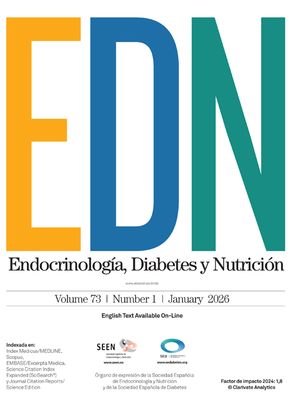Diabetes mellitus is a highly prevalent disease in the general population, and this is particularly relevant for patients who require hospital admission for any reason because of its impact on morbidity and mortality.1,2 Internal medicine departments assume a high proportion of admissions of elderly patients with diabetes and/or complex chronic diseases3 who have great difficulty in accessing the healthcare system because of their functional and cognitive limitations. The hospitalization of these patients is a good opportunity for optimizing blood glucose control, thus improving their health outcomes.
Both the consensus document on the treatment of hyperglycemia during the hospital stay published in 2009 by Pérez et al. and the 2015 ADA standards recommend the measurement of glycosylated hemoglobin A1c (HbA1c) levels during or in the three months prior to hospitalization.4,5 In an interesting article recently published in this journal by Sáenz-Abad et al.,6 the authors concluded that hospital protocols should consider HbA1c as one of the determinants of blood glucose control during the hospital stay, together with prior treatment, blood glucose levels at baseline and in the first 24h of admission, fasting, and the use of corticosteroids.
To analyze the adherence of our unit to international recommendations for measuring HbA1c levels during hospitalization, our group conducted a retrospective cohort study in a group of patients admitted for any reason to our internal medicine clinical management unit with a diagnosis of type 2 diabetes mellitus who were at least on metformin. The recruitment period was two and a half years (from November 2012 to April 2015), during which there were 330 episodes in 278 patients. The mean patient age was 76.7±9.4 years, with a distribution by sex of 45.8% males and 54.2% females. HbA1c was only measured during hospital admission in 143 (43.3%) of the episodes analyzed. The mean HbA1c level was 7.13±1.48% (range, 4.6–14.1), which agrees with the above mentioned study.5
To establish what should be considered as adherence to guidelines in terms of HbA1c measurement, nonfatal episodes were analyzed separately, because it was thought that healthcare professionals who cared for patients with a fatal vital prognosis during hospitalization did not consider it appropriate to determine the prior degree of blood glucose control in these patients as this would provide no clinical benefit and would therefore represent an unnecessary expense. Thus, the proportion of patients for whom HbA1c measurement was requested at admission and who were finally discharged was 49.1%. It may thus be concluded that HbA1c levels were not available during hospitalization in half the patients admitted. When patients in whom HbA1c had been tested in the three months prior to hospital admission were added, we found that HbA1c measurements performed during or in the three months prior to admission were not available for 87 (26.37% of all patients recruited) clinical episodes that resulted in discharge, although measurements had been performed in the previous year.
In a recent report by the same group of Sáenz-Abad et al.,7 HbA1c levels were not significantly associated with hospital mortality, being instead determined by blood glucose levels at admission and glycemic variability during the hospital stay. Hence, recommendations to measure HbA1c make no sense in patients with a poor prognosis at admission because a sufficient survival period during which benefits may be achieved from blood glucose control assessment and, thus, from changes in baseline treatment is unlikely. Moreover, information from the episode in question as a marker of hospital mortality would not be provided by such measurements. By contrast, the measurement of HbA1c has been shown to be an effective measure for optimizing blood glucose control in patients with diabetes admitted for any reason,8–10 and an opportunity to detect previously unknown cases of diabetes mellitus in multiple clinical settings.11,12
Based on the data provided, strategies are needed to emphasize the need to use hospitalization to optimize blood glucose control in our patients by measuring HbA1c as recommended by the guidelines and to detect elements of improvement, and even to consider HbA1c testing to make new diagnoses of diabetes. Evidence is still needed to define which patients benefit from routine HbA1c measurement during hospitalization. This is especially important in the population commonly seen, whose fragility means that actions aimed at achieving mid- or long-term benefit (other than the detection of hypoglycemia) may be of doubtful value.
Conflicts of interestThe authors declare that they have no conflicts of interest.
Please cite this article as: de los Santos Moreno A, Ruiz Blasco E, López Alonso B, Girón-González JA. La determinación de hemoglobina glucosilada durante la hospitalización como una oportunidad para valorar y optimizar el control glucémico en nuestros pacientes: una asignatura pendiente. Endocrinol Nutr. 2016;63:101–102.




